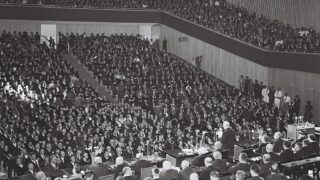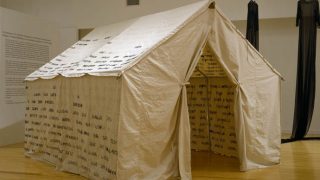“Spineless” by Egyptian musician Maurice Louca begins with no introductions floating over sentimental swamps. It immediately commences with the amplified sounds of the oboe, keyboard and different type of drums. 17 seconds into the piece, we hear the voice of “Ala 50” if it were a surplus yet necessary burden. It sends messages through short, disconnected sentences that do not relay a story but protect percussion from collapse: “life is a forest, and it’s mighty…..”
Louca, whose album “Salute the Parrot” was released on Ma’azef last year, represents a generation of Arab musicians who seem to have decided at once to toy with the sacred nostalgia. They chose, instead, to immerse themselves into the aesthetics of daily life details that manifest themselves in the feeling that everything could collapse all of a sudden. This feeling is, however, accompanied by a consciousness that there is no way to prevent this collapse other than relinquishing the privilege of imitating reality and believing that they are actually part of this reality. So, it is possible to regard those musicians as though they are floating in a cold meadow, only their heads surfacing as they try to breathe.
English
Ma’azef: Reclaiming History More Important than History Itself

Articles from Arab World
In Sudan, War Erodes What Remains of a Battered Health System
The Ministry of Health estimates total losses to the public and private healthcare sector in the Khartoum State at $12 billion. In a recent report, the state ministry revealed that...
The evolution of Palestinian political economy in the context of settler colonialism and genocide
What can we learn from the modern history of Palestinian political economy of a continuous struggle against domination by alien colonial economic and political powers?*
A Note to the world...from Professor Walid Khalidi
Palestinian Professor Walid Khalidi celebrated his 100th birthday, with a warning against the continuation of the Zionist plan that manifests pedigree as a child of a 19th century quintessentially European...
From the same author
Narrative and Memory
A large chunk of Palestinian artistic production concerned with the Palestinian cause derives its identity from the concept of poetic justice. This necessarily has to do with humanitarian purposes. We...




